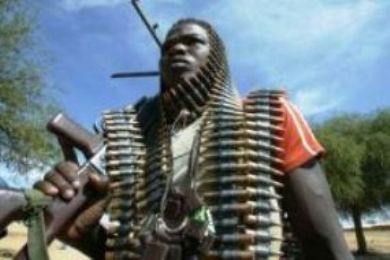Darfur rebels express distrut over talks with Sudan
December 9, 2007 (KORMA, Sudan) — A key Darfur rebel group voiced deep distrust about the idea of negotiating with Sudan’s government as a U.N. envoy toured the front lines on Sunday in a bid to restart peace talks.
 The Sudan Liberation Army’s top commanders lined up with their fighters, some on camel back, to greet envoy Jan Eliasson in the desolate hamlet of Korma, their stronghold on the edges of central Darfur’s mountains just 20 kilometers from government lines.
The Sudan Liberation Army’s top commanders lined up with their fighters, some on camel back, to greet envoy Jan Eliasson in the desolate hamlet of Korma, their stronghold on the edges of central Darfur’s mountains just 20 kilometers from government lines.
The main faction of the SLA, led by Abdelwahid al-Nur from his exile in Paris, has lost some military clout as it fractured into competing splinter groups, but still enjoys large support among Darfur civilians.
Al-Nur, however, is adamantly opposed to the new peace talks begun in Libya Oct. 24, and the negotiations have since stalled.
Eliasson appealed to his combatants and followers on the ground, urging them to realize that a planned U.N. and African deployment of peacekeepers would be compromised if negotiations are not under way by the beginning of next year.
“We need you in these talks, to give them credibility and standing with the people of Darfur,” said Eliasson, addressing the armed fighters of the SLA gathered under the shade of a tree on the wind-swept plateau. “You represent such an important movement, and so many of the people who have suffered in Darfur.”
The U.N. envoy suggested holding a U.N.-brokered meeting among the rebels to unify their positions.
Delegates present at the talks won’t even need to negotiate if they are not ready, he assured them, pleading with the SLA to at least be represented. “If you were to accept negotiations … this doesn’t mean you have to accept the result,” he told a skeptical crowd of battle-hardened rebels.
Echoing their absent chief, the guerrillas said they would not attend any negotiation until the planned U.N.-African Union force of 26,000 deploys in January and ends violence that has overwhelmed an AU mission currently in place.
With Khartoum reluctant to see more foreign fighters on its soil, the rebels suspect the hybrid force will be largely eviscerated by the time it deploys due to government objections to key equipment and forces.
Khartoum has stipulated that the force must be “predominantly African” and is now handpicking which countries it will allow to contribute troops, while also delaying the deployment through bureaucratic obstacles.
“The most important thing is that the peacekeepers should have a strong mandate, to be capable of defending themselves and civilians,” rebel commander Mohamed Adam Nimir said, in an implicit criticism of the current AU force that has suffered repeated casualties and all but given up on patrolling Darfur’s refugee camps.
More than 2.5 million Darfur civilians have fled to camps and 200,000 been killed in four years of fighting between the region’s ethnic African rebels and the Arab-dominated Sudanese government or militia allies. Several previous peace deals have failed, and refugees along with aid workers continue to face daily insecurity.
“Troops should be truly international, including experienced soldiers from Europe,” Nimir said, adding that his group would never agree to hold the talks in Libya, which it views as biased toward Khartoum.
Nimir also warned that peacekeepers from the Arab world and China would not be welcome.
China is Sudan’s strongest ally at the Security Council, and is accused of bypassing a U.N. arms embargo on Darfur by massive weapons deliveries to Khartoum.
“All the weapons we capture from government troops are ‘Made in China,'” Nimir said, doubting the 300 Chinese peacekeepers already deployed could be trusted.
Eliasson admits the task of brokering a new peace deal is daunting. He hopes negotiations will truly begin in early 2008 despite Al-Nur’s SLA boycott, and points at signs that some other rebel opinions may be shifting.
MEETING WITH URF REBELS
Earlier on Sunday, just an hour’s helicopter flight from Korma, the envoy met five rebel splinter groups who have reformed themselves into the United Resistance Front and are more amenable to joining the talks.
The rebels greeted Eliasson with a display of force meant to underscore their importance, with 15 pickups jammed with some 150 heavily armed fighters brandishing assault rifles, grenade launchers and a heavy caliber anti-aircraft gun.
The commanders told Eliasson they were ready for the negotiations, and hoped to draw other splinter factions into their umbrella group.
“We know there is no military solution,” said commander Abdallah Banda, a former top leader of the Justice and Equality Movement, the other main rebel faction rejecting the talks.
“We are all Sudanese, if we keep fighting we’ll all die.”
(AP)
